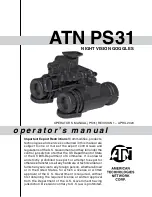
1-10
1-11
1.3. PRINCIPLES OF OPERATION
1.3.1. MECHANICAL FUNCTIONS
The mechanical functions of the NVG allow for differences in the
physical features of individual operators and provide for operating
the system. These functions include the power switch, eye relief ad-
justment, diopter adjustment, and objective focus. The mechanical
controls are identified in Figure 1.3.
1.3.2. OPTICAL FUNCTIONS
The optical functions include an objective lens, image intensifier
and eyepiece lens (Figure 1.4.). The objective lens collects light
reflected from the night scene by the moon, stars, or night sky, in-
verts the image and focuses that image on the image intensifier.
The image intensifier converts the captured light into a visible im-
age and reinverts the image which can then be viewed through the
eyepiece lens.
PHOTOCATHODE
MICROCHANNEL
PLATE
FIBER-OPTIC INVERTER
PHOSPHOR
SCREEN
OBJECTIVE
LENS
IMAGE
INTENSIFIER
POWER
SUPPLY
EYEPIECE
LENS
EYE
FIGURE 1.4. OPTICAL FUNCTION DIAGRAM
1.3.3. ELECTRONIC CIRCUIT FUNCTION
The electronic circuit regulates the direct current voltage from the
battery to the image intensifier and IR source as required. It also
monitors the output voltage of the battery and turns on a low-bat-
tery indicator when the available battery voltage is 1.9–2.1 Vdc.
a. Power Source
The electronic circuit is powered by one battery.
b. Auto Mode
The automatic mode is different from the “IR” mode, and the auto-
matic mode starts the environment detection sensor. It can detect
environmental luminance in real time and work with reference to the
illumination control system. Under extremely low or extremely dark
environment, The system will automatically turn on infrared aux-
iliary lighting, and when the environmental illumination can meet
normal observation, The system automatically turns off “IR”, and
when the ambient illumination reaches 40–100 Lux, The whole sys-
tem is automatically shut down to protect the photosensitive core
components from damage by strong light.
Summary of Contents for ATN PS31
Page 5: ...iii 1 1 CHAPTER 1 INTRODUCTION ...
Page 11: ...2 1 CHAPTER 2 OPERATING INSTRUCTIONS ...
Page 28: ...3 1 CHAPTER 3 MAINTENANCE INSTRUCTIONS ...
Page 32: ...Notes Notes ...





























